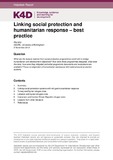| dc.contributor.author | Idris, Iffat | |
| dc.coverage.spatial | Turkey | en |
| dc.coverage.spatial | Lebanon | en |
| dc.coverage.spatial | Cameroon | en |
| dc.date.accessioned | 2019-11-21T11:46:53Z | |
| dc.date.available | 2019-11-21T11:46:53Z | |
| dc.date.issued | 2019-11-05 | |
| dc.identifier.citation | Idris, I. (2019). Linking social protection and humanitarian response: Best practice. K4D Helpdesk Report 684. Brighton, UK: Institute of Development Studies. | en |
| dc.identifier.uri | https://opendocs.ids.ac.uk/opendocs/handle/20.500.12413/14782 | |
| dc.description.abstract | This review looks at the alignment of humanitarian response in refugee crises with national social protection systems. It examines the experience of three countries dealing with protracted refugee situations: Turkey, Lebanon and Cameroon, and also identifies lessons from other literature. The number of people affected by crises and disasters continues to rise, and humanitarian refugee crises are becoming more and more prolonged. There are a number of ways in which social protection and humanitarian responses can be linked: a) using existing social protection programmes to prevent/manage disasters; b) using humanitarian response to build social protection systems, particularly in situations of extreme fragility where social protection systems are absent or very weak; c) in situations of forced displacement, social protection can become a cornerstone of strategies to reduce vulnerability and promote self-reliance. This review focuses on the latter, which entails alignment of humanitarian response for refugees with national social protection systems. In the context of the humanitarian response to the Syrian refugee crisis, there have been considerable innovations in social assistance interventions with regard to approaches, tools and systems. Most notably the widespread use of cash-based interventions, common vulnerability and targeting methodologies, common delivery systems and technology for identification and cash delivery. There has also been considerable progress in terms of promoting resilience among affected people. There is huge potential to implement these initiatives at scale and promote more inclusive and sustainable social protection for all. | en |
| dc.language.iso | en | en |
| dc.publisher | IDS | en |
| dc.relation.ispartofseries | K4D Helpdesk Report;684 | |
| dc.rights.uri | https://www.nationalarchives.gov.uk/doc/open-government-licence/version/3/ | en |
| dc.subject | Aid | en |
| dc.subject | Rights | en |
| dc.subject | Social Protection | en |
| dc.title | Linking Social Protection and Humanitarian Response – Best Practice | en |
| dc.type | Helpdesk | en |
| dc.rights.holder | © DFID - Crown copyright 2019 | en |
| dcterms.dateAccepted | 2019-11-05 | |
| rioxxterms.funder | Department for International Development, UK Government | en |
| rioxxterms.identifier.project | K4D | en |
| rioxxterms.version | VoR | en |
| rioxxterms.funder.project | 238a9fa4-fe4a-4380-996b-995f33607ba0 | en |

